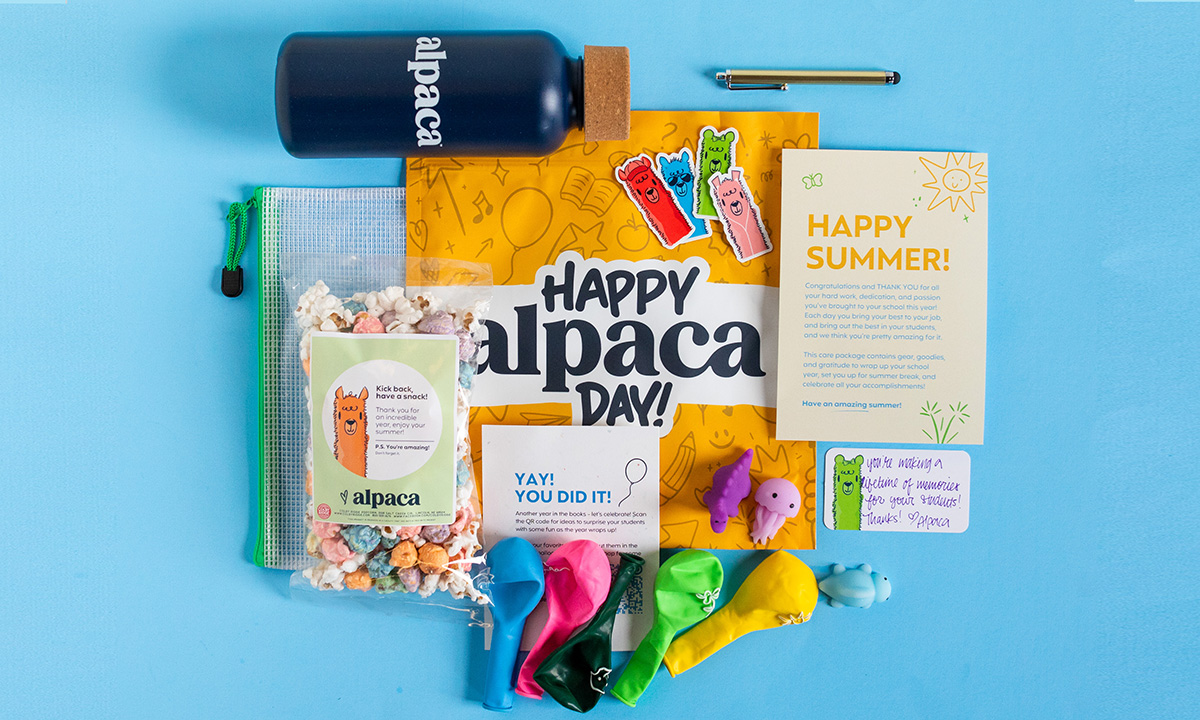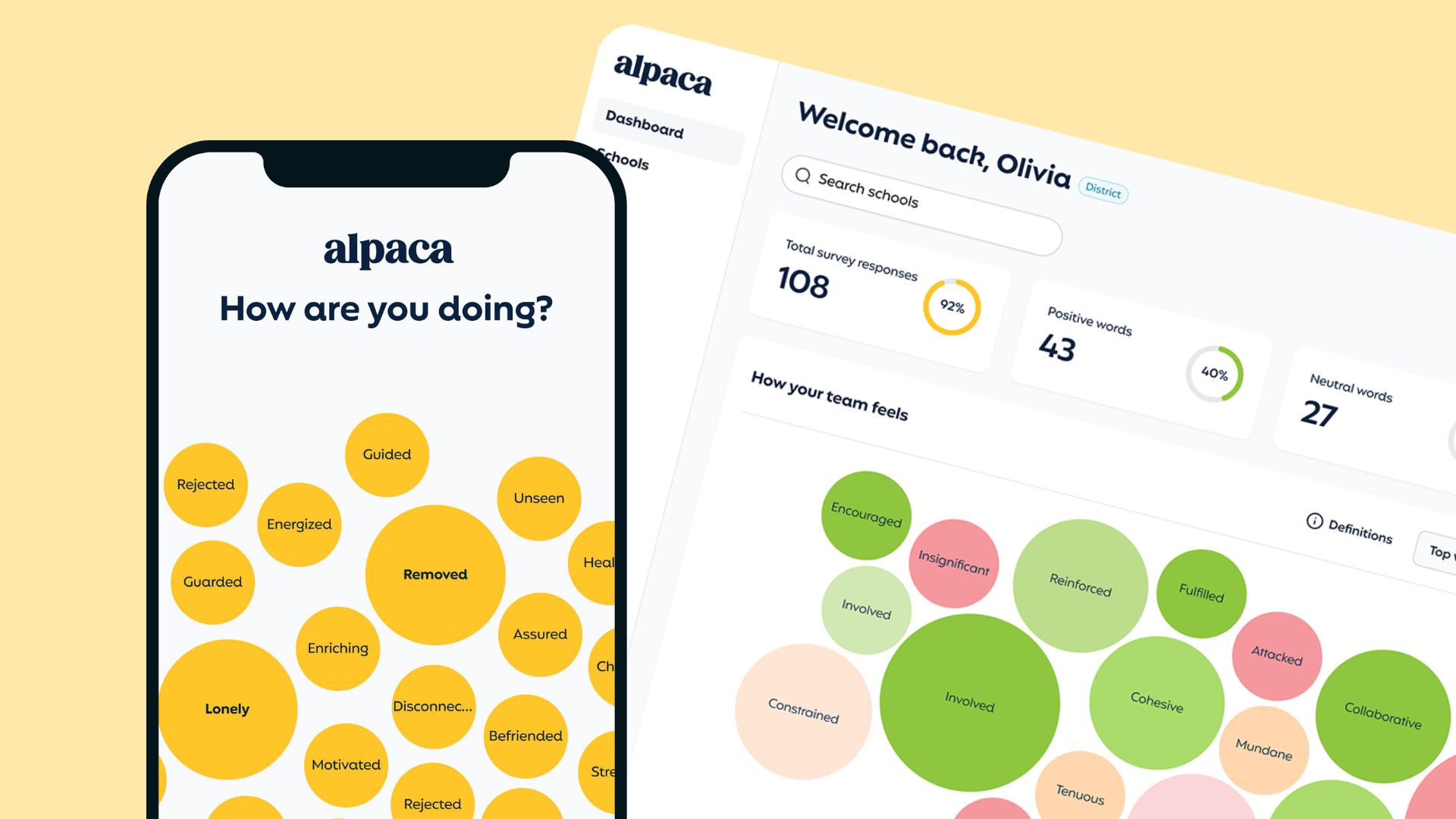Ed Tech Startup Boosts Teacher Well-Being With Feelings Check-ins and Care Packs
Districts in 25 states use Alpaca products to help teachers feel better about their jobs, their schools and themselves.

Get stories like this delivered straight to your inbox. Sign up for The 74 Newsletter
Committed. Exhausted. Comfortable. Frazzled. Valued. Stuck.
Once a month, staffers at Sullivan Middle School in Sullivan, Illinois, pick adjectives to describe their feelings about work as part of an anonymous online survey.
Principal Nathan Ogle said the short questionnaire, which he implemented in October, has helped transform employee culture at the rural school of 250 students. It’s one of the products offered by Alpaca, an education technology startup that’s trying to improve teacher well-being across the U.S.
The company has pulse surveys, downloadable resources and staff care packages that schools and districts can purchase. Since its 2022 launch in Omaha, Nebraska, Alpaca has worked with more than 100 schools and districts in 25 states. It received multiple awards in January at the 2025 Future of Education Technology Conference, which features ed tech innovations and businesses.
“It’s been incredibly useful just to get that feedback from my staff on what things they’re feeling and experiencing,” Ogle said. “I’ve been able to respond to that stuff as it’s coming in, more or less in real time.”
During the 2023-24 school year, 48% of public school teachers reported declining mental health that impacted their work, up from 42% the year before, according to a 2024 EdWeek Research Center study. The percentage of teachers who reported their schools offered minimal or no employee wellness programming increased from 68% in 2023 to 72% in 2024.
For Alpaca’s founder, Karen Borchert, the focus is employee engagement and retention: “What does it feel like to go to work when you are a teacher, what is it like and what could make it better?” Borchert went to college to become a high school teacher, but after earning her degree became interested in nonprofits and startups. She decided to create her own company after the pandemic hit and school staff shortages worsened.
She began by selling subscription care packs to teachers and schools. The packs — which inspired the name Alpaca — cost $25 to $35 each and include items like snacks, pens, notepads, markers, tissues, lip balm and a handwritten note.

Last year, Alpaca launched its online pulse survey along with free downloadable resources like staff activities, teacher appreciation tips and strategies to help administrators make their employees feel valued. Borchert said most of the schools that use Alpaca will have staff complete the survey in monthly meetings. Some use Alpaca’s digital resources to host games and give out the care packages as prizes.
“We love to see them work together as a system or as a platform,” Borchert said. “And then, by the time the principal gets back to their office, all of their survey data is live and ready, and they can see what’s needed.”
Ogle said the monthly pulse surveys are more useful than his district’s annual climate survey, which doesn’t provide results until after the school year is over. When he began implementing the survey last fall, many teachers said they felt stretched thin and wanted time to plan with one another.
In response, he restarted a school tradition of “Working Wednesdays.” Administrators took over supervising students during lunch so teachers could use that time to collaborate with colleagues.
“Since we’ve implemented that, ‘stretched thin’ is no longer a phrase that people are choosing” on the survey, he said. “I have staff members who, if I just went and asked them, ‘Hey, how are you doing?’ They’re going to say, ‘Fine,’ because that’s what they do. But this gives them that opportunity to anonymously let me know how they’re really doing.”
Alpaca’s reach also extends beyond schools and districts.
High Desert Education Service District, a Bend, Oregon, agency that places thousands of substitute teachers in 10 nearby school districts every year, began using Alpaca in 2024. Part of the state’s Department of Education, High Desert uses the pulse survey for the subs to rank how they feel about working in different schools and districts. Substitutes also receive Alpaca packs when they accept a certain number of school assignments.
Borchert said Caddo Parish Public Schools in Shreveport, Louisiana, uses the products in its alternative teacher certification academy. And the University of Nebraska-Lincoln uses the pulse survey and care packages for its student teachers.
Sue Kemp, a professor in the university’s special education department, said the survey results help her decide which schools to place student teachers at to gain practical experience in the classroom.
“It gives me a better picture about how the students are feeling and doing in their school,” she said. “I get a better snapshot of the support that they’re feeling in the school and in their own skill development, and what they need on top of it.”
The student teachers and the educators who are supervising them in the classroom also receive monthly Alpaca packs as a way to say “good job” or “thank you” for their work, Kemp said. She said the students and the supervisors have reported that the care packages make them feel more positive about their jobs and more connected to the college.
“We are at a moment where I think our educators are going to need so much care, and they’re going to need so many good support systems,” Borchert said. “They’re going to need to be able to say how they’re feeling and what they need while we kind of walk through uncertain or unprecedented times.”
Get stories like these delivered straight to your inbox. Sign up for The 74 Newsletter

;)
